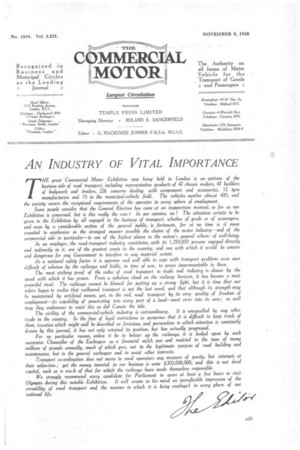AN INDUSTRY OF VITAL IMPORTANCE
Page 115

If you've noticed an error in this article please click here to report it so we can fix it.
THE great Commercial Motor Exhibition now being held in London is an epitome of the business side of road transport, including representative products of 47 chassis makers, 47 builders of bodywork and trailers, 226 concerns dealing with components and accessories, 12 tyre manufacturers and 15 in the municipal-vehicle field. The vehicles number almost 400, and the variety covers the recognized requirements of the operator in every sphere of employment.
Some people consider that the General Election has come at an inopportune moment, so far as our Exhibition is concerned, but is this really the case? In our opinion, no ! The attention certain to be given to the Exhibition by all engaged in the business of transport, whether of goods or of passengers, and even by a considerable section of the general public, is fortunate, for at no time is it more essential to emphasize in the strongest manner possible the claims of the motor industry—and of the commercial side in particular—to one of the highest places in the nation's general scheme of well-being.
As an employer, the road-transport industry constitutes, with its 1,250,000 persons engaged directly and indirectly in it, one of the greatest assets in the country, and one with wEtich it would be unwise and dangerous for any Government to interfere to any material extent.
As a national safety factor it is supreme and well able to cope with transport problems even now difficult of solution by the railways and liable, in time of war, to prove insurmountable to them.
The most striking proof of the value of road transport to trade and industry is shown by the speed with which it has grown. From a nebulous cloud on the railway horizon, it has become a most powerful rival. The railways cannot be blamed for putting up a strong fight, but it is time that our rulers began to realise that railbound transport is not the last word, and that although its strength may be maintained by artificial means, yet, in the end, road transport by its very quality of freedom of employment—its capability of penetrating into every part of a land—must Come into its own; as well may they endeavour to resist this as did Canute the tide.
The virility of the commercial-vehicle industry is extraordinary. It is unequalled by any other trade in the country. In the face of legal restrictions so numerous that it is difficult to keep track of them, taxation which might well be described as ferocious, and persecution to which attention is constantly drawn by this journal, it has not only retained its position, but has actually progressed. For no particular reason, unless it be to bolster up the railways, it is looked upon by each successive Chancellor of the Exchequer as a financial mach cow and mukted to the tune of many millions of pounds annually, much of which goes, not to the legitimate purpose of road building and maintenance, but to the general exchequer and to assist other interests. Transport co-ordination does not mean to road operators any measure of parity, but attempts at their subjection ; yet the money invested in our business is some £.300,000,000, and this is not dead capital, such as is mall of that for which the railways have made themselves responsible. We strongly recommend every candidate for Parliament to spare at least a few hours to visit Olympia during this notable Exhibition. It will create in his mind an ineradicable impression of the versatility of road transport and the manner in which it is being employed in every pha,...! of our national life.












































































































































































































































































































